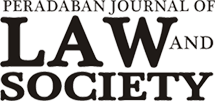Universality and Contextuality of Islamic Law
a Perspective from Wael B. Hallaq and Thaha Jabir Alwani
DOI:
https://doi.org/10.59001/pjls.v2i2.112Keywords:
Contextuality, Islamic Law, Wael Bahjat Hallaq, Thaha Jabir Alwani, UniversalityAbstract
The article delves into the concepts of universality and contextuality within Islamic law from the perspectives of two eminent scholars, Wael Bahjat Hallaq and Thaha Jabir Alwani. The research aims to comprehend these scholars' views on the universality and contextuality of Islamic law in the contemporary context. The research methodology involves a meticulous analysis of Hallaq and Alwani's written works and a comprehensive review of pertinent literature. The findings suggest that, while both scholars concur that Islamic law embodies universal values applicable across time, they also underscore the significance of comprehending the social and cultural context when applying Islamic law. Hallaq emphasizes the necessity of a profound understanding of the principles of Islamic law to address contemporary challenges, whereas Alwani highlights the flexibility of Islamic law in adapting to changing times. These findings offer valuable insights into the effective implementation of Islamic law in diverse global and local contexts.
References
Abdul Basit, M. A. (2019). An Introduction to Wael B Hallaq ‟s Works and Thoughts. Al-Qamar, 2(2), 127–144.
Adam, A. F. Bin. (2018). Konsep Al-Ittijah Al-Hida’i Dalam Pemahaman Al-Quran: Kajian Terhadap Pemikiran Taha Jabir Al-‘Alwani Dalam Kitab Ma‘Alim Fi Al-Manhaj Al-Qur’ani Ahmad (Vol. 1). Universiti Malaya Kuala Lumpur.
Al-Alwani, T. J. (1990). Uṣūl al fiqh al Islāmī: Source methodology in Islamic jurisprudence: Methodology for research and knowledge (Y. T. D. A. S. Al Shaikh-Ali, Ed.). Herndon, Virginia USA Research: The International Institute of Islamic Thought.
Al-alwani, T. J. (2006). Islamic Thought An Approach to Reform. London: The International Institute of Islamic Thought.
Al-Alwani, T. J. (2011). The Ethics of Disagreement in Islam. The Journal of Islamic Faith and Practice, 2(2), 1–6.
Darmalaksana, W. (2020). Metode Penelitian Kualitatif Studi Pustaka dan Studi Lapangan. Pre-Print Digital Library UIN Sunan Gunung Djati Bandung, 1–6.
Ecep Ishak Fariduddin. (2022). Kontekstualisasi Hukum Islam dalam Realitas Sosial-Budaya Perspektif Wael B. Hallaq. The Indonesian Journal of Islamic Law and Civil Law, 3(1), 17–38.
Fad, M. F. (2019). Kontekstualisasi Maqashid Shari’ah Dalam Sustainable Development Goals. Iqtisad Reconstruction of Justice and Welfare for Indonesia, 6(2), 130–155. https://doi.org/10.31942/iq.v6i2.3142
Family, I. (2016). In Celebration of the Life of Shaykh Taha Jabir al-‘Alwani. American Journal of Islam and Society, pp. 13–18. https://doi.org/10.35632/ajis.v33i2.905
Ferdi Fatih Ates. (2019). Is the gate of Ijtihad open? Bayan College.
Fikri, I. F. (2018). Universalitas Islam dan Lokalitas Budaya Dalam Bingkai Islam Nusantara. Teosofi: Jurnal Tasawuf Dan Pemikiran Islam, 8(1), 1–8.
Ghazalii, P. M. D. M. R. (2017). Adab Perbezaan Pendapat dalam Islam Menurut Taha Jabir Al-Alwani. Journal of Fatwa Management and Research, 9, 39–59.
Hallaq, Wael B. (2019). Usul al-Fiqh and Shafi’i Risala Revisited. Journal of Arabic and Islamic Studies, 19, 129–183.
Hallaq, Wael Bahjat. (1994). From Fatwas to Furu’: Growth and Change in Islamic Substantive Law. Islamic Law and Society, 1(1), 29–65.
Hallaq, Wael Bahjat. (2013). “The Impossible State: Islam, Politics, and Modernity’s Moral Predicament.” (I). New York: Columbia University Press.
Hallaq, Wael Bahjat. (2022). Law and legal theory in classical and medieval Islam. Routledge.
Juliansyahzen, M. I. (2022). Rekonstruksi Nalar Hukum Islam Kontemporer Muhammad Shahrur Dan Kontekstualisasinya. Al-Mawarid Jurnal Syariah Dan Hukum (JSYH), 4(1), 57–74. https://doi.org/10.20885/mawarid.vol4.iss1.art4
Kahhorova, G. S. (2022). The Notions of Wael Hallaq on an Introduction To Islamic Law. American Journal Of Social Sciences And Humanity Research, 02(06), 63–67. https://doi.org/10.37547/ajsshr/volume02issue06-12
Madjid, N. (2019). Islam: Doktrin & Peradaban. Gramedia pustaka utama.
Maleeha, Zahoor Alam, M. A. (2020). Closure of The Gate of Ijtihad. Al-Azhar, 6(1), 196–210.
Mochmad, Z. F. (2022). Reformulasi Tafsir Bil Ma’tsur (Menimbang Manhaj Tafsir Al-Qur’an bi al-Qur’an Gagasan Thaha Jabir al-‘Alwani dalam Kitab Tafsir al-Qur’an bi al-Qur’an) Zakiyal. Journal of Indonesian Tafsir Studies, 01(1), 30–34.
Moh. Anas Kholis. (2021). Menyemai Pendidikan FIKIH BEYOND THE WALL (Menumbuhkan Living Toleransi di Tengah Mazhab Fikih di Indonesia) (I; S. Rohmah, Ed.). Malang: Intelegensia Media.
Moh. Anas Kholish, K. R. (2015). Menjadi Muslim Nusantara Rahmatan Lil’Alamin (Ikhtiar Memahami Islam dalam Konteks KeIndonesiaan) (I; Siti Rohmah, Labib Muttaqin, Ed.). Bantul Yogyakarta: Naila Pustaka.
Muhammad Ichrom, A. B. (2020). Epistemologi Usul Al-Fiqh Taha Jabir Al-Alwani: Antara Ortodoksi dan Modernitas. Jurnal Al Wasith: Jurnal Studi Hukum Islam, 7(1), 1–20.
Shaw, D. (2020). “Restating Orientalism: A Critique of Modern Knowledge by Wael B. Hallaq.” Ariel: A Review of International English, 51(1), 167–170.
Shodiqin, M. A. (2014). Muhammadiyah itu NU! : Dokumen fiqih yang terlupakan (II; M. Zahruddin, Ed.). Jakarta: Noura Books.
Sibawaihi. (2007). Hermeneutika Alquran Fazlur Rahman (I; MH.Abid, Ed.). Yogyakarta: JALASUTRA.
Sugiono. (2019). Metode Penelitian, Kuantitatif Kualitatif, dan R&D (Sutopo, Ed.). Bandung: ALFABETA.
Taufiq, A. (2018). Pemikiran Abdullah Ahmed An-Naim tentang Dekontruksi Syari’ah sebagai Sebuah Solusi. International Journal Ihya’ ’Ulum al-Din, 20(2), 145–166. https://doi.org/10.21580/ihya.20.2.4044
Warikum Sumitro, Moh. Anas Kholish, L. M. (2017). Hukum Islam dan Hukum Barat (I; D. Y. P. K., Ed.). Malang: Setara Press.
Downloads
Published
Issue
Section
License
Copyright (c) 2023 Md Yazid Ahmad, Thohir Luth, Siti Rohmah

This work is licensed under a Creative Commons Attribution 4.0 International License.




